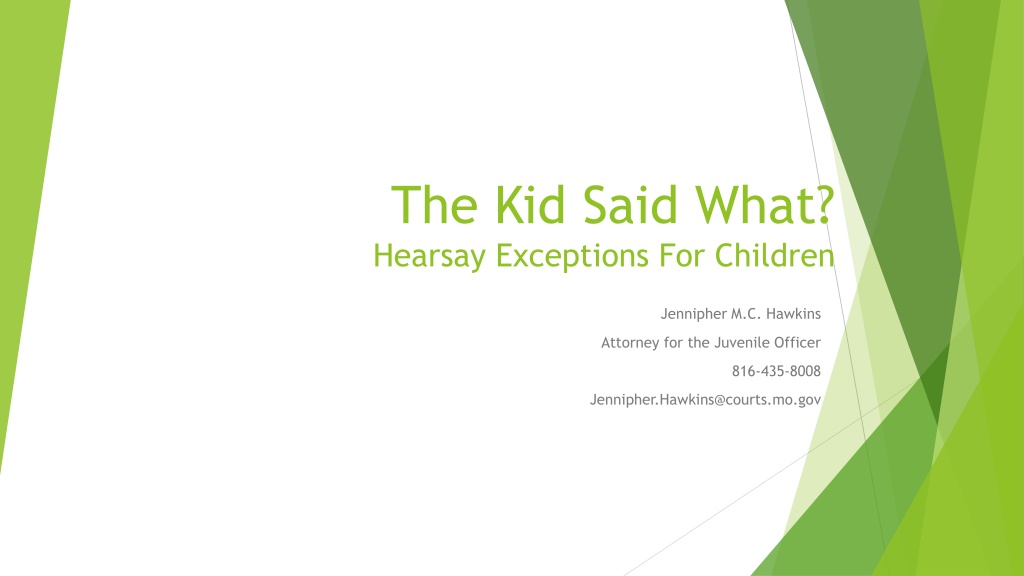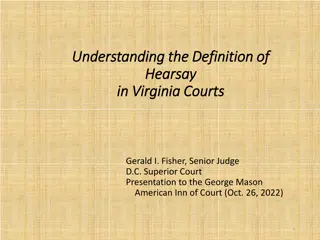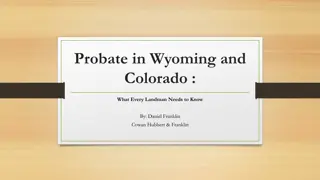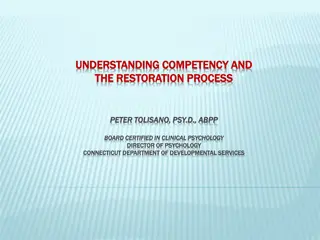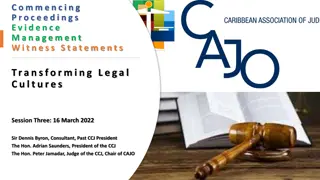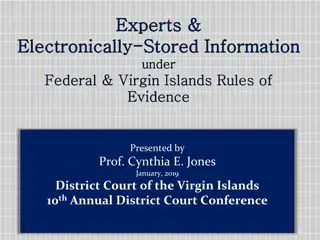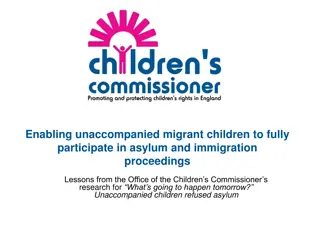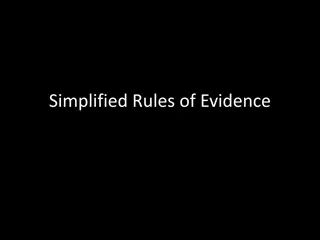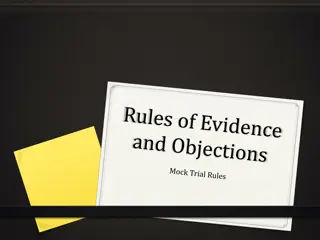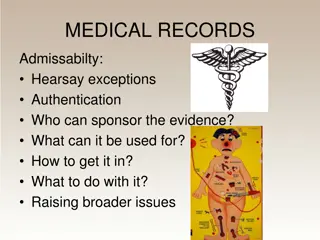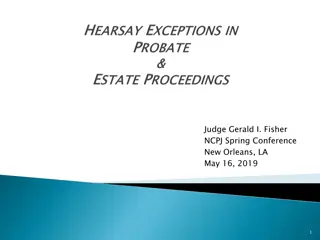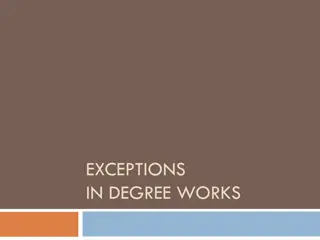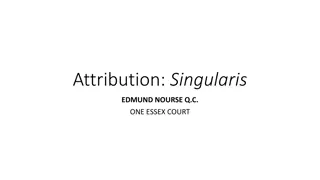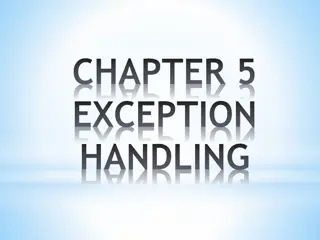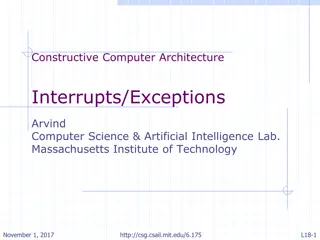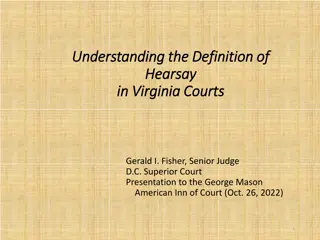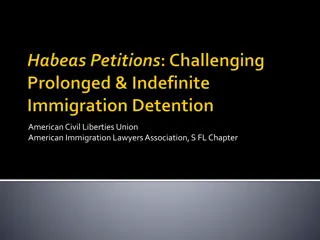Understanding Hearsay Exceptions for Children in Legal Proceedings
Exploration of hearsay exceptions for children in legal contexts, including how out-of-court statements are considered, the importance of minimizing emotional trauma for children, and specific cases illustrating the application of special exceptions in child abuse situations.
Download Presentation

Please find below an Image/Link to download the presentation.
The content on the website is provided AS IS for your information and personal use only. It may not be sold, licensed, or shared on other websites without obtaining consent from the author. Download presentation by click this link. If you encounter any issues during the download, it is possible that the publisher has removed the file from their server.
E N D
Presentation Transcript
The Kid Said What? Hearsay Exceptions For Children Jennipher M.C. Hawkins Attorney for the Juvenile Officer 816-435-8008 Jennipher.Hawkins@courts.mo.gov
Hearsay Generally An out of court statement offered for the truth of the matter asserted We have tons and tons of exceptions to hearsay We have specific exceptions for a child s out of court statements-criminal, domestic, and juvenile
I Thought Kids Have to Testify? I Have Rights! Yes and no, sometimes kids do have to testify, but not always. Missouri has long recognized the importance of minimizing emotional trauma for children, particularly with having a child testify against an abuser. (In re Marriage of P.K.A. 125 S.W.2d 78, 81 (Mo. App. S.D. 87), Flexibility is needed in these cases because of the emotional trauma that such an experience may cause . ) Oftentimes, kids disclose abuse to several people (family, friends, school personnel, medical professionals, forensic interviewers, law enforcement, etc.). Shouldn t we be allowed to use these statements? Why have the kid testify, if the kid has already disclosed what happened? It s traumatic to constantly relive it, isn t it? 1. Credibility 2. Strategy
In re the Marriage of P.K.A. and J.E.A, 725 S.W.2d 78 Facts-Child disclosed sexual abuse to mom and psychologist, so mom wouldn t allow the child to go with dad during his parenting time. Mom and psychologist testified at trial about the child s disclosures. Dad objected, saying it was hearsay. Court made several findings: The necessity to have statements of a child indicating abuse considered for their truth calls for a special hearsay exception. Where the best interest of the child is the primary concern, we believe that the courts should consider those statements for their truth. Although it may be an unfavorable reflection of the father if he has not been abusing the child, the paramount consideration must be the welfare of the child. Where there is a substantial basis to believe that the statements of the child are true, courts are justified in hearing and considering them to prevent further or potential abuse to a child. This exception should be used only where abuse may have occurred, or has been threatened, and the child might not be competent or reasonably expected to testify to it.
Hord v. Morgan, 769 S.W.2d 443 Facts: There was an ongoing modification action to make changes to the parenting plan to alleviate the travel the kids would do between parents. During all of this, one of the children disclosed to a counselor/mom s friend that he was punished by dad, and his bruises were caused by dad. Court s findings: It is difficult to say that, under the rationale of the court in P.K.A., the special exception should only be applied in cases where sexual abuse is alleged. The goal of the exception is to prevent child abuse and to attempt to alleviate the consequent trauma that a child may experience through testifying. PKA applies to emotional and physical abuse too
In the Interest of A.A.T.N. 181 S.W.3d 161 Facts: TPR case. AJO pled father committed severe and recurrent acts of physical, emotional, and sexual abuse (repeated abuse, hit and punctured the child with a fork, held a lighter to the child s knee, etc.). Several professionals (the child s therapist, Children s Division Worker, and psychologist) testified about the child s fear of the father and the emotional trauma that would come from reunifying with the father. Court sustained the petition as to physical and emotional abuse, not as to sexual abuse. Father argued PKA should only be limited to sex abuse, not emotional or physical abuse. Court s findings: The child s accounts of abuse were admissible under the hearsay exception articulated in PKA. Allowing hearsay statements may be preferable to forcing a child to testify, especially when the abuser is the child s parent.
In the Interest of S.M. 750 S.W.2d 650 Facts: Father sexually abused the two children. Mother, a sheriff, and a family treatment supervisor, and a psychologist testified about the sex abuse allegations. Father argued that the witness testimony violated his 6th Amendment Right to Confrontation. Court s Findings: The PKA Exception applies to non-jury sexual abuse cases where (1) the best interest of the child is the primary concern, (2) sexual abuse may have occurred, or has been threatened, (3)the child might not be competent or reasonably expected to testify, and (4) there is a substantial basis that the statements are true. The 6th Amendment does not apply because juvenile court proceedings are neither criminal nor penal in nature. Motions to Modify (in domestic cases) are civil in nature.
Pope v. Child Abuse and Neglect Review Board, 309 S.W.3d 362 Facts: Father sexually abused his child. The child was reluctant to talk with the investigator from CD, but she had described the abuse to her mother and sister. Father then had a POE finding and was placed on the CAN registry. Father argued that child hearsay only applied to child custody cases. Court s Findings: The trial court properly considered all of the factors under PKA Two other tribunals had already found by a preponderance of the evidence that the sexual abuse had occurred, The unreasonableness of expecting the child to testify against her father, A finding that all of the statements the child made to others were substantially the same, Two separate hotlines in January 2006 alleging sexual abuse
D.S. v. Greene County Juvenile Officer 562 S.W.3d 366 Facts: TPR case. Father has two children. The children have half-siblings. The half-siblings had forensic interviews, disclosed Father physically abused them. Father argued the statements of the half-siblings were inadmissible under PKA. Court s Findings: Court seemed to create a test to use for whether this case applies to a child s statement: (1)is there a parent-child relationship with the alleged abuse? (2) does the alleged abuser have a legal right to or potential for future custody or visitation with the half-sibling? (3)are the half-siblings best interests an issue in the proceeding before the trial court? In the absence of these trustworthiness dynamics and their constraints upon the trial court s trustworthiness inquiry, a declarant child s statement should not come within the PKA Exception.
Comparing Greene County to RSMo 491.075 How do criminal courts handle child hearsay? Defendants have a right to Confrontation, including with children. RSMo 491.075-Statements of a Child are Admissible When: The child is under 14 years of age or a Vulnerable Person, AND There is a showing that the time, content, and circumstances of the statement provide sufficient indicia of reliability, AND The child is unavailable as a witness, OR The child is otherwise physically available to testify but the Court finds that the significant emotional or psychological trauma which would result from testifying in the personal presence of the defendant makes the child unavailable as a witness Only allowed in cases involving Offenses Against the Person, Sexual Offenses, Offenses Against the Family, and Pornography and Related Offenses Vulnerable Person = a person who, as a result of an inadequately developed or impaired intelligence or psychiatric disorder that materially affects ability to function, lacks the mental capacity to consent ,or whose developmental level does not exceed that of an ordinary child of 14 years of age
Comparing Greene County to RSMo 491.075 RSMO 491.075 doesn t even require a child to be a victim to have his/her statements admitted But, keep RSMo 491.060 in mind discusses who is considered incompetent to testify A person who is mentally incapacitated A child under ten years of age, who appears incapable of receiving just impressions of the facts respecting which the child is examined, or of relating them truly; provided, however, that except as provided in subdivision (1) of this section, a child under the age of ten who is alleged to be a victim of an offense pursuant to chapter 565, 566 or 568 shall be considered a competent witness and shall be allowed to testify without qualification in any judicial proceeding involving such alleged offense. State v. Javier Barker-410 SW3d 225 (Mo App WD 2013)
Comparing Greene County to RSMo 491.075 Indicia of Reliability-Factors to Consider 1. Spontaneity and consistent repetition 2. Mental state of the declarant 3. Lack of motive to fabricate 4. Use of terminology unexpected of a child of similar age State v. Redman, 916 S.W.2d 787 (Mo. Banc 1996)
So, what do we do if Greene County applies? Distinguish your case Things to consider when trying to distinguish your case: Go through each of the 3 factors in Greene County how long has the perpetrator been in the home, what kind of relationship does the perpetrator have with the child, are the parent and the perpetrator married and/or planning to get married, how long does the perpetrator intend to reside in the home, how are the half-siblings involved in the case against the perpetrator, what type of case is your case, etc. Look at RSMo 211.132 and 210.110 to make the argument that there is a relationship Follow the requirements of RSMo 491.075 Provide notice to Opposing Counsel of your intent to use the child s statements (including the content of the statements) Argue that even criminal cases (with the highest burden of proof) allow out of court statements made by children into evidence, regardless of the relationship to the perpetrator
So, what do we do if Green County applies? Brief the issue Need a clear and concise explanation of your argument with the pertinent law Consider doing a separate hearing from the trial/adjudication Put on evidence to demonstrate proving your case is different from Greene County Put on evidence of the emotional trauma the child will go through/is currently going through (i.e. a letter from a therapist, psychologist/therapist testimony, placement provider, etc.) Advantages You ll know if the child needs to testify ahead of time, can prepare accordingly, use the date of trial to focus exclusively on the trial issues, etc. Disadvantages It s an extra hearing to prepare, limited docket space
So, if this kid needs to testify, what do I do? Notify the child s GAL ASAP Review all of the child s statements Draft your direct examination questions accordingly Schedule a time to meet the child Ask the child to tell you what happened, if appropriate Ask clarifying questions, if needed run the child through what your questions will be in court talk to the child about what the courtroom looks like, who will be there, who will question him/her, what happens if someone gets out of control, etc.-take away the unknowns
Understanding the Process of Disclosure is Critical to Preparing Your Direct Process of Disclosure Denial Tentative Active Recantation Reaffirming Recantation does not always kill our cases! Occurs in some cases, but not all Usually, recantations don t make sense Child claiming she talked about semen initially because she was thinking of water Studies have shown that non-supportive mothers are more likely to have children who recant the initial disclosure (think of your failure to protect cases)
Understanding the Process of Disclosure is Critical to Preparing Your Direct-Cont. There are many reasons a child may not have initially disclosed to anyone Fear Shame Guilt Lack of understanding Lack of opportunity Relationship to the perpetrator Having a basic understanding of child development can be helpful too Talking to a 3 year old is much different than talking to a 15 year old
Making the Child Comfortable During Direct Examination Child Witness Protection Act-RSMO 491.725 Applies as a matter of law to 14 and under 15-17 year old: discretion of the Court Consider Pre-Trial Motions (must be Made 30 days prior to the proceeding) Alter the courtroom layout (move tables, podium, etc.) Have a support in the courtroom Comfort items Age-appropriate/child friendly oath Developmentally appropriate language Child-friendly tone/voice for objections
I have to cross-examine a child??? Yes, you may have to cross a child. But, remember, this is not your time to have a My Cousin Vinny moment-You should be able to do a soft cross. My grandma always said you get more flies with honey than you do with vinegar. Keep in mind that this is a child testifying about something very traumatic with mom, dad, and/or the perpetrator listening.
Common Defenses-Cross Examination Themes The child was coached Does not happen often, usually pretty obvious The forensic interviewer/parent/witness was leading the child Research shows that by age 10, a child is no more suggestible than an adult The child made inconsistent statements Remember, disclosure is not a linear process Child s age may cause inconsistent statements The child is lying Find the corroboration evidence (bring this out on your direct) The child recanted The child was interviewed too many times Multiple FIs may have been necessary (think of the child s age, developmental level, recantation vs. reaffirmation interview)
Do the parents sit in the courtroom while the child testifies? Abuse and Neglect Cases An attorney can file a motion to exclude a parent from a courtroom. Supreme Court Rule 124.03-the Court may exclude a parent from a proceeding. 124.03(f)-Court may exclude the presence of a juvenile s parent from any part of a hearing for good cause, exceptional circumstances, or where exclusion will serve the best interests of the juvenile. The Court shall consider, among other things, the relationship between the juvenile and the juvenile s parents and any request for exclusion of the juvenile s parents Domestic Cases RSMo 452.385 Court can do an in chambers interview to interview a child Attorneys are allowed to be present and participate There shall be a record of the interview
Last Slide!-Tips, Tricks, and Tidbits Attend trainings put on by your CPC/CAC When preparing your FI to testify, make sure you discuss the process of disclosure, including recantation Even if the child still has to testify, this can be very beneficial! Read your discovery as soon as possible to see if Greene County will apply Make sure you have the case law with your trial prep, ready to go Remember the child s age Be patient
